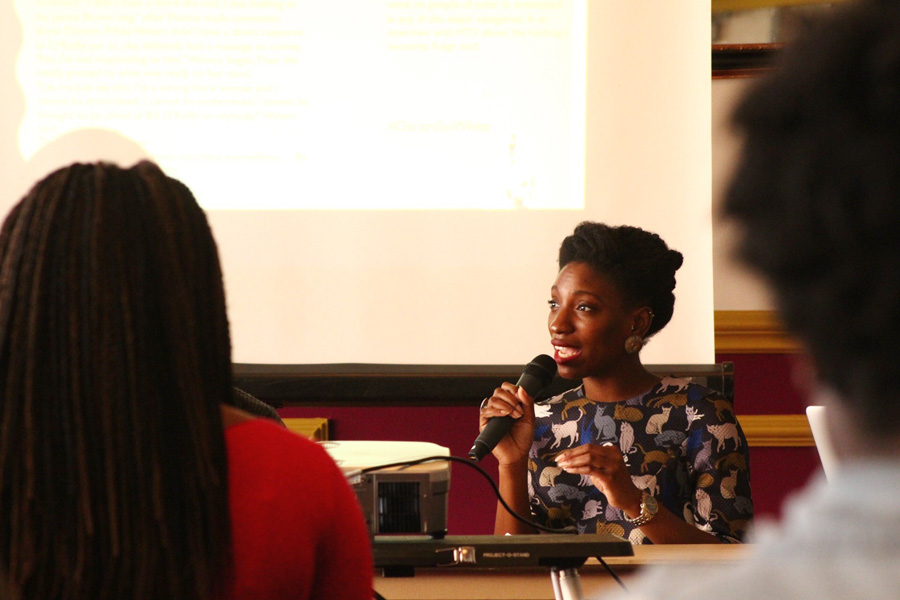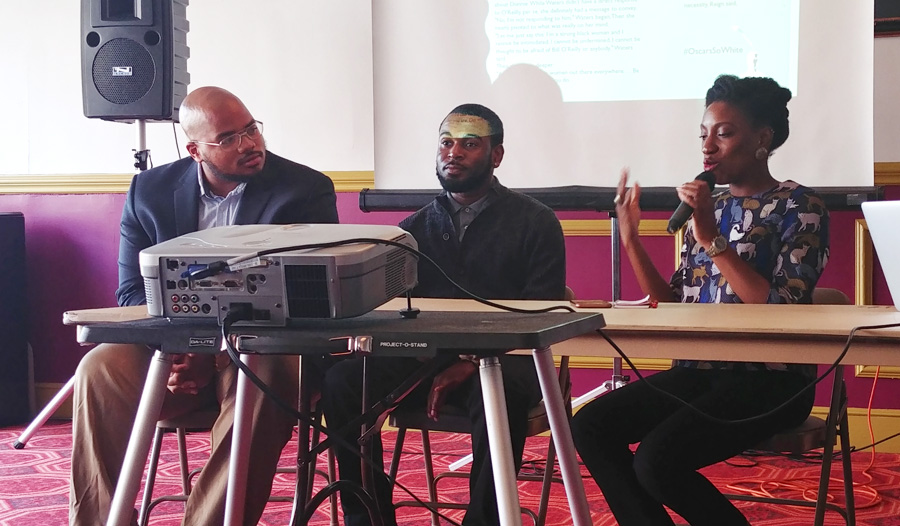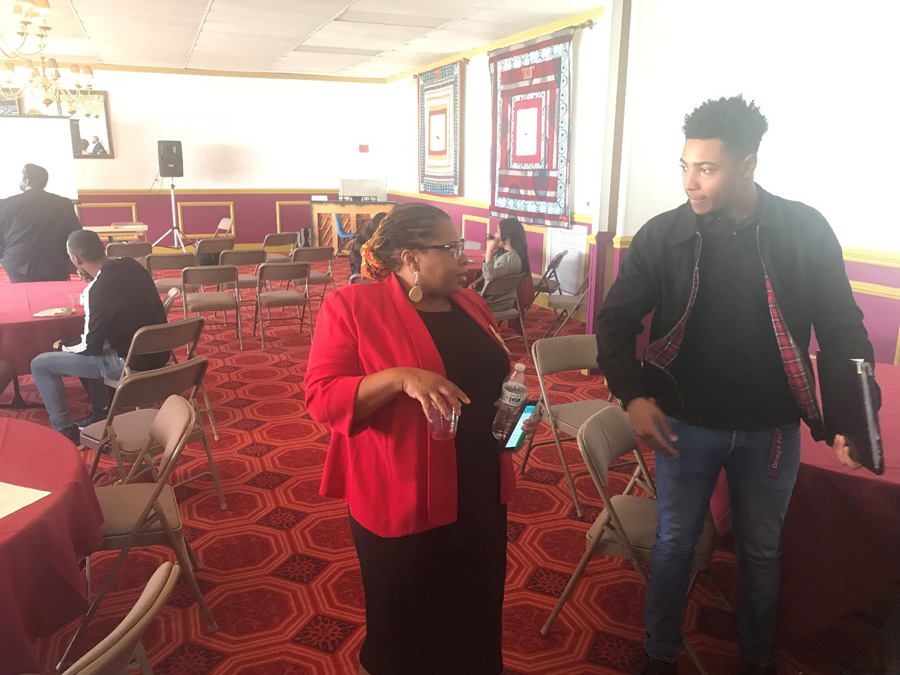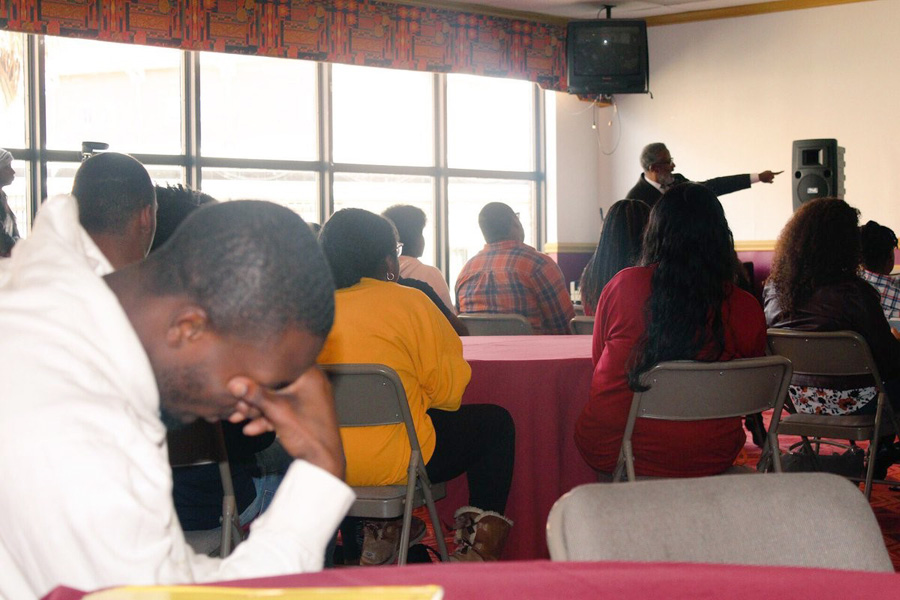Advocacy journalism in age of social media
By: Panther Staff
Feb 14, 2018

Olanma Hazel Mang speaks about hashtag activism. (Panther photo by Jelah Anderson)
Related videos:
https://youtu.be/QF1oqcS2x30
https://youtu.be/pzvjs-YIqqk
By ALEXIS BOOKMAN
Dr. Arlecia Simmons and her social media class were hosts for "Advocacy Journalism in Troubled Time: From Lynchings to #BlackLivesMatter" on Thursday, Feb. 8.
The event was held in conjunction with the 50th anniversary observance of the 1968 Orangeburg Massacre, the shootings by state law officers that claimed the lives of three students and wounded 28 others at South Carolina State University.
Guest speaker Dr. Kenneth Campbell, University of South Carolina associate professor, addressed the journalistic work of Claflin alumnus Nathaniel J. Frederick and media during the Civil Rights Movement.
Some quotes from Campbell:
“I will use Nathaniel J. Frederick as an example to go forward, and also backwards.”
“He fought for equal rights for African-Americans in the early 1900s."
“He was an importance journalist, lawyer and activist."
“The connection we have though social media today is the connecting we’ve been trying to get all long.”
During the event, Claflin mass communications students shared the current trends of hashtag activism.
A powerful movement: hashtagging
By JASMINN DOW
A senior from Claflin University made a presentation on the #MeToo movement during the advocacy journalism event on Thursday, Feb. 8, 2018.
Her teacher, Dr. Arlecia Simmons, planned the event to be on the 50th anniversary of the Orangeburg Massacre. Sarah Brogdon, mass communication major, presented a PowerPoint on #MeToo.
“#MeToo addresses … sexual harassment and sexual assault in America,” she said.
The hashtag became popular in 2017 after the Harvey Weinstein accusation began an explosion in accusations involving notables in entertainment, media and government. However, Brogdon said the origin of the hashtag was 10 years ago, and the founder is Tarana Burke.
“A lot of people believe it started in 2017,” she said.
Both women and men have used the #MeToo. Brogdon said she sees the lifespan for the movement as endless.
“It can always be used because people are always being sexual assaulted.”
She shared that the movement has reached the entertainment industry. She name a few celebrities who used the hashtag.
“Gabrielle Union, Lady Gaga, and the list goes on and on.”
Social media has helped people open up and relate to people across the world, said Brogdon, who believes it is an important hashtag. “It makes both men and women feel comfortable about opening up.”

Olanma Hazel Mang leads the discussion. (Panther photo by Jasminn Dow)
Social media vs. real involvement
By JELAH ANDERSON
During the Feb. 8 event, a panel of students discussed social media platforms as they relate to today’s activism.
Hazel Mang led a discussion about how people today should be more active outside of social media. She said the value of conversation has gotten lost because it is easy to send out a tweet.
Social media is great because it allows others to join the conversation, but it is not all good, Mang said. “People have forgotten how to have a conversation without it resulting in insult.”
People today do not have to go out to protest like it was back in the civil rights era. Instead of protesting on the streets, there are hashtags that get people across the world involved.
“The rest of the world can go through the changes with America,” Mang said. She said America has always been the frontrunner of change.
Another panelist, Samuel Mobley, agreed with Mang on her points about social activism. “Social activism is the new wave to get the messages out.”
Mobley also believes that more needs to be done outside of the social media world.

Claflin Mass Communication professor Dr. Arlecia Simmons introduces herself to S.C. State journalism major Brandon Brantley, a junior from Charleston. (Panther photo by Elijah Mckinnnis)
What participants had to say
By ELIJAH MCKINNIS
South Carolina State University journalism student Brandon Brantley: “One surprising thing that I learned from the panel of advocacy journalism is the fact no one was ever charged or brought forth to justice due to the Orangeburg Massacre. Another takeaway is the belief reporters are objective but their work brings to light injustice.”
By STEPHEN ANDERSON
Dr. Karl Wright, provost at Claflin University, on what he found most interesting about Dr. Campbell’s presentation: “Black newspapers (Baltimore newspaper) helped with changing the country because white media didn’t highlight important events.”
By TYMIYAH TYLER
Claflin senior Youshi Kirkland: “I feel that racism shouldn’t be taken to the level of killing one another. It’s saddening that, in many situations, racismstill goes on.”

Youshi Kirkland during the Feb. 8, 2018, event focused on advocacy journalism. It was held on the 50th anniversary of the Orangeburg Massacre. Kirkland reacts as guest speaker Dr. Kenneth Campbell talks about the killings of African-Americans. (Panther photo by Tymiyah Tyler)